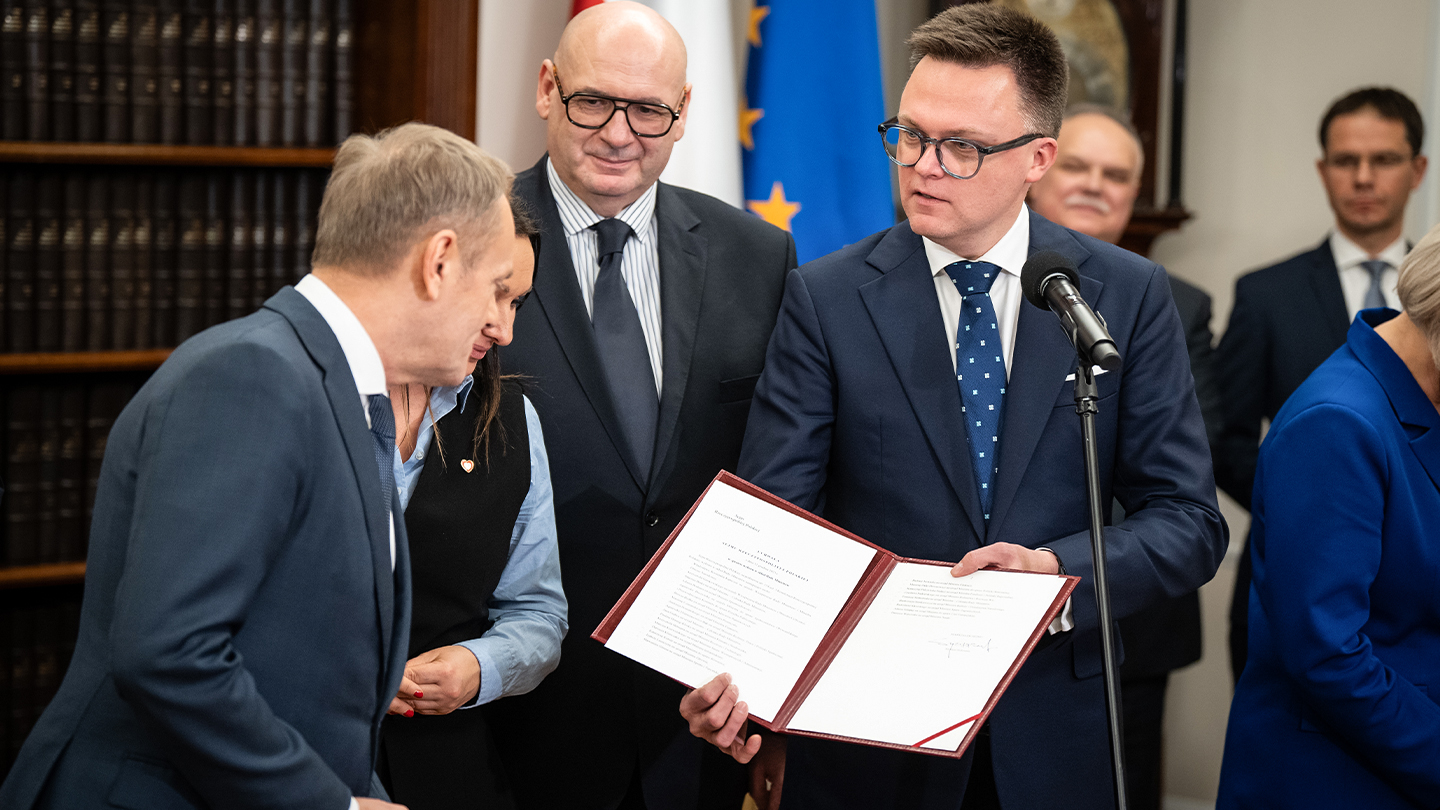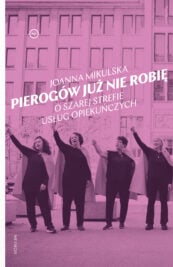Katarzyna Przyborska: Rząd Donalda Tuska dostał w waszym badaniu tróję. Średnio. Bo od wyborców PiS pałę, od Konfederacji pałę z plusem, od Lewicy i TD tróję i od elektoratu KO 4 plus. A jednocześnie Polki i Polacy są zasadniczo zadowoleni i czują się bezpiecznie.
Adam Traczyk: Rzeczywiście, przykładając szkolną miarę do wyników naszych badań, można stwierdzić, że rząd sprawuje się na 3+, ale Polakom żyje się dzisiaj lepiej, niż żyło im się rok temu – co najmniej na czwórkę z plusem. Sytuacja ekonomiczna jest postrzegana jako lepsza niż w schyłkowym okresie rządów PiS, wzrosła odczuwalna jakość życia. Może to efekt niższej inflacji, odczuwalnego przyśpieszenia gospodarczego, podwyżek w budżetówce, do tego KPO, dzięki czemu możemy się czuć pewniej, wiemy, że zastrzyku unijnych pieniędzy nie zabraknie.
Generalnie jest więc całkiem nieźle. Problemem koalicji jest natomiast to, że owa poprawa sytuacji niekoniecznie jest w pełni postrzegana jako zasługa rządu.
A jakby przełożyć to samopoczucie na segmenty? Wyróżniacie w badaniach siedem kluczowych grup: postępowych zapaleńców, pasywnych liberałów, zawiedzionych samotników, niezaangażowanych normalsów, spełnionych lokalistów, dumnych patriotów i oddanych tradycjonalistów. Spora część wyborców Lewicy należy do segmentu postępowych zapaleńców. Zadowolenie średnie. Podobnie elektorat Trzeciej Drogi, który wystawił rządowi tróję.
U wyborców Lewicy faktycznie widać zniecierpliwienie i rozczarowanie, ale dominującą emocją jest nadzieja. Widzą oni, że ten rząd w kilku aspektach nie dowiózł jeszcze oczekiwanych rezultatów choćby w kwestii prawa do przerywania ciąży czy związków partnerskich, ale dają mu jeszcze kredyt zaufania. Patrząc szerzej, postępowi zapaleńcy najwięcej od tego rządu oczekiwali, ale i najmocniej go wyczekiwali i są z nim najsilniej emocjonalnie związani, i oni oceniają go ostatecznie najlepiej.
Z kolei w elektoracie Trzeciej Drogi, który tworzy mieszanka centrowych segmentów, czyli niezaangażowanych normalsów, spełnionych lokalistów, zawiedzionych samotników i pasywnych liberałów, nie ma szerokiego zniecierpliwienia tym, co robi rząd, ale jest pewne zobojętnienie. W październiku 2023 roku dla dużej części tych wyborców kluczowe było ukrócenie kłótni, brutalizacji języka politycznego, ale wchodzenia polityki z buciorami do ich życia. Ich celem było więc odsunięcie PiS od władzy, ale nie mieli jasno sprecyzowanej wizji polityki na przyszłość. Stąd ich aktualne wycofanie.
To pragnienie uspokojenia znalazło się wtedy w haśle „Dość kłótni, do przodu”. Jednak nie tylko oni stracili zainteresowanie polityką. Jest ono widoczne we wszystkich segmentach. Gdyby wybory miały być dzisiaj, to frekwencja byłaby niższa niż niemal 75 proc., a na wielki marsz przedwyborczy nie byłoby szans. Czy to wynika z rozczarowania, czy z tego, że nie da się trwać w takim wzmożeniu zbyt długo? Ono rośnie, a potem sinusoidalnie opada.
Pamiętajmy też, że tak wysoka frekwencja była nie tylko zaskakująca, ale i efektem licznych kampanii mobilizacyjnych. Dziś wracamy do stanu naturalnego potęgowanego zapewne też poczuciem części obywateli, że ten rząd może i nie jest najlepszy, ale im osobiście nie zagraża. Nie pcha się z polityką do każdego aspektu życia – o prawa do przerywania ciąży po sądzącą się z ekranów telewizorów propagandę. Część wyborców o to walczyła, wrzucając głos do urny 15 października – o możliwość odcięcia się od polityki i teraz odbiera swoją nagrodę. Wreszcie ma chwilę oddechu po trójskoku wyborczym. Ale dzisiejszy spadek zainteresowania polityką może być tylko ciszą przed burzą wyborów prezydenckich.
Czy da się ich zmobilizować do wyborów prezydenckich?
Tego jeszcze nie wiemy. Tak jak nie wiedzieliśmy kilka miesięcy przed wyborami 15 października, czy młode kobiety tłumnie pójdą wrzucić swój głos do urny. Wszystko zależy, czy rząd pokaże wyborcom, że warto bronić jego dorobku i dać szansę na więcej. Wielu umiarkowanych i średnio aktywnych politycznie wyborców w 2019 było gotowych bronić rządu PiS, bo dzięki niemu żyło im się lepiej. Teraz koalicja musi przekonać wyborców, że warto bronić jej dorobku, ale i pozwolić na przyśpieszenie.
Gdybyś miał doradzić w kwestii wyboru kandydata na prezydenta, to zgodnie z tym, czego oczekują wyborcy, kogo byś zasugerował? Powinien być polaryzujący czy zasypujący podziały?
Idealny prezydent łączy, jest prezydentem wszystkich Polaków, stawia na wspólnotę. Problem w tym, że taki kandydat nie ma szans na dostanie się do drugiej tury, bo o tym decydują żelazne elektoraty poszczególnych obozów politycznych. Kandydat spoza układu – Kukiz, Hołownia czy historycznie Tymiński – mogą namieszać w pierwszej turze, czasem ustawić także nastroje pod drugą turę. Ale bez totalnej zapaści jednego z głównych obozów politycznych nie przebiją się do niej, nawet jeśli teoretycznie mogliby mieć szanse na zwycięstwo – jak Hołownia w 2020 roku.
Idealny kandydat więc elektryzuje, ekscytuje swój własny elektorat, ale niekoniecznie polaryzuje, bo to mobilizowałoby również przeciwników politycznych. A w pierwszej turze po prostu ważne, żeby mieć wybór, żeby nie być skazanym od razu na mniejsze zło i móc wesprzeć kandydata lub kandydatkę reprezentującą naszą tożsamość, poglądy i wizje przyszłości. Dobrze więc, że ucichła już dyskusja o jednym kandydacie koalicji rządzącej. To ważne również dla pluralizmu politycznego.
A w drugiej turze?
Potrzebujemy kandydata, który da nam dozę pewności, że będzie potrafił nas przeprowadzić przez trudne czasy. Widzimy, że Polacy łakną bezpieczeństwa, choć jednocześnie czują się w Polsce bezpiecznie. Do tego pojęcie bezpieczeństwa jest wielowątkowe – począwszy od twardego bezpieczeństwa militarnego, przez energetyczne, kwestię migracji, po bezpieczeństwo ekonomiczne i osobiste. Niekoniecznie chodzi więc o kogoś w mundurze ani o wzbudzanie dodatkowych lęków, ale emanowanie pewnością siebie, o kogoś z pewnym gravitas, kogoś, kto będzie ostoją.
W czasie konwencji 12 października jako pierwszy po Donaldzie Tusku wyszedł Rafał Trzaskowski, przemawiał najdłużej, mówił o społeczeństwie obywatelskim, obronie cywilnej, samorządach. Z kolei Radosław Sikorski zapowiedział kilka konkretów z poziomu bezpieczeństwa i rozwoju, miejsca w Europie – dokładnie to, co wychodzi w badaniach. Zarysowały się dwie figury – a takie konwencje jak ta ostatnia to testy mające sprawdzić, która lepiej zagra?
Dokładnie tak, sztuka będzie polegała na znalezieniu odpowiedniego balansu pomiędzy tymi miękkimi i twardymi aspektami bezpieczeństwa. To bardzo ciekawy, korespondencyjny pojedynek. Radosław Sikorski ma chyba swój najlepszy czas. Nie polaryzuje, a wręcz zyskuje uznanie także bardziej konserwatywnego elektoratu. Ale z punktu widzenia mechaniki wyborczej kluczowe będzie zmobilizowanie nie tylko centroprawicowego elektoratu, ale także utrzymanie przy Koalicji Obywatelskiej elektoratu lewicowego, bardziej progresywnego. A do tego idealnym kandydatem jest Rafał Trzaskowski.
A dla elektoratu lewicowego nie ma nic gorszego od PiS-u i zagłosują na mniejsze zło. Albo zostaną w domach.
O tym, czy wejdziesz do drugiej tury, decydują żelazne elektoraty, a o tym, czy w niej wygrasz, umiejętność zbudowania zwycięskiej koalicji, w wyniku wyborów prezydenckich zadecydują właśnie te nieduże elektoraty. Widzieliśmy różnicę między Andrzejem Dudą a Rafałem Trzaskowskim w poprzednich wyborach. To są naprawdę niewielkie przesunięcia, które będą gwarantowały zwycięstwo.
Czy Radosław Sikorski w drugiej turze będzie w stanie przeciągnąć tylu wyborców lewicy co Trzaskowski, czyli 85 proc., czy tylko 75 proc.? Ta różnica może być tutaj kluczowa. Z drugiej strony wydaje się, że Sikorski choćby za sprawą asertywnej postawy wobec Ukrainy mógłby łatwiej przyciągnąć część elektoratu Konfederacji. Ale czy byłoby to znacząco więcej, niż udało się Trzaskowskiemu, czyli niemal 50 proc.?
Kogo trzeba będzie mobilizować aktywniej? Zawiedzionych samotników, niezaangażowanych normalsów i spełnionych lokalistów?
Nie tylko mobilizować, ale przede wszystkim przekonywać. Niezaangażowani normalsi rzadko głosują, ale mogą docenić władzę, która gwarantuje im dobre i spokojne życie, albo skarcić wprowadzających niepokój. Zawiedzeni samotnicy często szukają alternatyw spoza duopolu. Spełnieni lokaliści to pole rywalizacji sił centroprawicowych. No i pasywni liberałowie, segment ważny dla obozu liberalnego, bo choć PiS nie ma tam czego szukać, to Konfederacja już tak. Do tego, choć zgodnie z etosem klasy średniej uważają, że w dobrym tonie jest zagłosować, to trzeba jednak dopilnować, żeby zamiast tego nie wybrali weekendu poza miastem albo wzięli zaświadczenie.
Czy można ich zaangażować aspiracyjnie?
Można, choć nie jest to oczywiste. Pasywni liberałowie to osoby, które w dużej mierze są skupione na swoim osobistym sukcesie, karierze. Państwo nie powinno im przeszkadzać, nie wtrącać się, ale tworzyć warunki do rozwoju.
Czyli PO powinna jednak stworzyć jakąś strategię, mieć wizję przyszłości rozpisaną na konkretne elementy? I Radosław Sikorski, który mówił o „trójskoku” rozwoju kolei i samolotów, to jest to, co elektorat chce usłyszeć?
To z pewnością pomogłoby zredukować pewien deficyt, z którym zmaga się obecna władza. W to, że ma ona jasną wizję rozwoju Polski, wierzy mniej niż jedna trzecia społeczeństwa. Trochę mało.
Czyli wielkie projekty rozwojowe, jak z II Rzeczpospolitej, to przepis na sukces?
Takie projekty są widocznymi symbolami rozwoju. W naszym badaniu Polacy deklarują, że czują z nich dumę. W naszych badaniach fokusowych często słyszymy, że Polacy są dumni z infrastruktury w naszym kraju. Warto zwrócić uwagę, że rozwój nie jest jednowymiarowy. Gdy spytaliśmy Polaków wprost, czy rząd powinien się skupić przede wszystkim na dużych inwestycjach, czy poprawie jakości usług publicznych, to minimalnie wygrała ta druga opcja.
To czym można mobilizować pasywnych liberałów i zawiedzionych samotników?
Dla obydwu segmentów ważniejsze są usługi publiczne. Pasywni liberałowie to indywidualiści, oni nie łakną aż tak bardzo zbiorowych symboli rozwoju. Zawiedzeni samotnicy to z kolei polscy left-behinds, którzy najbardziej cierpią na zapaści państwowych usług, bo nie stać ich na prywatne. To pokazuje, że na rozwój trzeba stale patrzeć holistycznie. Nowe lotnisko i szybka kolej są fajne, ale ważne, żeby nie zgubić w tym wszystkim zwykłego człowieka, który nie może czekać w kolejce do lekarza bez końca.
Sprawdziliście, jaka powinna być idealna Polska za 10 lat, i znowu okazuje się, że większość na pierwszym miejscu wymienia bezpieczeństwo. Dalej w kolejności: sprawiedliwa, demokratyczna, praworządna, silna, zjednoczona, tolerancyjna i szanowana na świecie. Brzmi fajnie. I po sobotnich konwencjach wydaje się, że politycy te badania znają, bo taką Polskę właśnie przedstawiali. Jak to jest w poszczególnych elektoratach?
Bezpieczeństwo jest na podium we wszystkich elektoratach wszystkich partii obecnych w Sejmie. Tylko w przypadku elektoratu Koalicji Obywatelskiej nie jest na pierwszym miejscu, a na trzecim, na równi z praworządnością, ustępują demokracji.
I wracamy do punktu wyjścia – czujemy się bezpieczni, ale widzimy też szereg zagrożeń, które mogą zmącić ten stan. I to jest wyzwanie dla elit politycznych – co zmienić, aby nic się nie zmieniło.
Czy przez transfery socjalne w społeczeństwie wzrósł poziom aspiracji? Czy chcemy jeszcze brać udział w zawodach na najtęższego stachanowca, ciągle gonić Niemcy, czy już być na tym samym poziomie?
Transfery raczej nie podniosły poziomu aspiracji, ale pozytywnie wpłynęły na poziom oczekiwań wobec państwa i elit politycznych. Nie ma już wymówek – trzeba dowozić. A co do aspiracji, to widzimy, że jesteśmy pewniejsi siebie, asertywni, uważamy, że nie mamy się czego wstydzić, nie jesteśmy już młodszym bratem. Natomiast kwestia gonienia Zachodu została trochę zakamuflowana – Niemcy mają swoje CPK, to dlaczego my go jeszcze nie mamy?
Czyli pomysł Morawieckiego, by podwoić przeładunkowość portów i rywalizować z Hamburgiem i Antwerpią, jest dobry?
Dobra jest perspektywa odrzucenia niedasizmu i kompleksów wobec Zachodu. Warto, aby nasze plany rozwojowe osadzone były jednak w pewnej trzeźwej ocenie rzeczywistości. Zbyt często w naszej historii żyliśmy już mirażami.
Donald Tusk wskazał jako podstawę myślenia o bezpieczeństwie kontrolę migracji. Czy jesteśmy gotowi zapłacić za to rezygnacją z praw człowieka, militaryzacją Podlasia?
To, czego Polacy na pewno sobie życzą niezależnie od podziałów partyjnych i widzimy to po naszych badaniach wyraźnie, to poczucie kontroli. Poczucie tego, że w kwestiach migracji panuje pewien porządek. To nie jest poczucie motywowane ksenofobią, odruchami antymigranckimi, bo raptem 20 proc. Polaków za kluczowy priorytet naszej polityki migracyjnej uznaje zmniejszenie liczby osób przybywających do Polski. Zdecydowana większość Polaków nie ma też nic przeciwko, żeby ich sąsiadem była osoba z Bliskiego Wschodu czy z Afryki, czy też muzułmanin. Ważne jest natomiast to, żeby świat wokół mnie był uporządkowany i przewidywalny. Donald Tusk mówił o tej właśnie kontroli, ale także o szacunku dla migrantów pracujących w Polsce, o stworzeniu warunków do integracji. To kombinacja, na której można budować zaufanie.
Jednak stwierdził jednocześnie, że prawo wróci na granicę dopiero wtedy, kiedy wszyscy będą wiedzieli, że tą drogą się nie da przejść.
Kwestia zawieszenia prawa do azylu jest bezsprzecznie problematyczna i w mojej ocenie jej wysunięcie było zbędne. Oczywiście można argumentować, że to tylko zalegalizowanie stanu faktycznego. Przecież wnioski azylowe na granicy i tak nie są w większości przyjmowane. Niemniej, choć jak pokazały najnowsze badania, propozycja premiera cieszy się wysokim poparciem społecznym, to chyba niepotrzebnie podgrzał on atmosferę. Podobnie jak Bartłomiej Sienkiewicz, w ostrych słowach krytykując organizacje prawnoczłowiecze. Rozumiem potrzebę zwrócenia uwagi opinii publicznej na stanowcze i twarde kroki rządu, ale życzyłbym sobie mniej antagonizującego tonu i docenienia roli instytucji, które chronią prawa człowieka. Wyrzucenie poza nawias obrońców praw człowieka i postawienie ich w takiej roli, w jakiej stawało ich PiS – jako elementu antypaństwowego – jest niezwykle groźne dla demokracji i ładu liberalnego, dla których prawa człowieka są esencją.
W polskim społeczeństwie absolutnie jest potencjał na to, żeby oprzeć politykę migracyjną, ale i opowieść o polityce migracyjnej zarówno na zapewnieniu bezpieczeństwa, jak współczuciu i szacunku dla drugiego człowieka.
To wynika z badań? Na czym opierasz ten optymistyczny wniosek?
Gdy pytaliśmy w naszych badaniach, co dla Polaków jest najważniejsze w kwestii migracji, najwięcej Polek i Polaków wskazało uzyskanie pełnej kontroli nad tym, kto może migrować do Polski. Było to 43 proc. Kolejne 21 proc. respondentów jako najważniejszą kwestię wskazało humanitarne traktowanie i pełne stosowanie prawa do ubiegania się o azyl osób przekraczających polską granicę. To pokazuje, że polityka migracyjna oparta na utrzymaniu kontroli i porządku oraz na empatii może znaleźć poparcie większości społeczeństwa.
Co dalej z niespełnionymi obietnicami sprzed roku, jak związki partnerskie i prawa kobiet? Czy to jeszcze w ogóle interesuje ludzi, czy zawiesili swoje oczekiwania na kołku i czekają na zmianę prezydenta?
Czeka na to elektorat koalicji i z pewnością jest to rysa na jej wizerunku. Media pisały już, że w kancelarii premiera dyskutowane są pomysły połączenia wyborów prezydenckich z referendum aborcyjnym. To byłaby próba ucieczki do przodu i mobilizacji elektoratu. Widzimy bowiem, że temat aborcji jest przez społeczeństwo szybko przenoszony do sfery prywatnej i wymaga ponownego politycznego rozpalenia. Podobnie było przed wyborami rok temu, czego dowodem były liczne kampanie profrekwencyjne skierowane do kobiet. Teraz premier mógłby powiedzieć: w Sejmie się nie udało, prezydent Duda i tak by zablokował, ale zróbmy to razem – w referendum i wybierając nową głowę państwa, który podpisze stosowną ustawę. Taktyka ta oczywiście nie jest pozbawiona ryzyka i wad, ale może być kusząca.
Z waszego badania wynika, że najpowszechniejszą emocją wobec rządu w całym społeczeństwie jest rozczarowanie, za którym kroczy jednak nadzieja. Poza tym złość, zniecierpliwienie. Skąd te odczucia? I do kogo należą, gdy ogół rozbije się na segmenty?
Rozczarowanie jest przede wszystkim emocją elektoratu Prawa i Sprawiedliwości. W elektoratach koalicji dominuje poczucie pewnej nadziei i dotyczy to wszystkich partii tworzących koalicję. Nadzieja to emocja nakierowana ku przyszłości. Pokazuje to dotychczasowy bilans rządu, nie jest jeszcze zadowalający, ale nie zużył on całego kredytu zaufania.
Czyli jest szansa, żeby to społeczeństwo jeszcze zmobilizować przed wyborami prezydenckimi?
Na pewno tak. Zresztą widzimy, jak się rozkładają sondaże partyjne. Co prawda nie każdy daje po przeliczeniu na mandaty większości obecnej władzy, ale widzimy, że nawet jeżeli ci mniejsi koalicjanci troszeczkę dołują, to odpowiednio wzmacnia się Koalicja Obywatelska, więc wyborców popierających partie rządzące jest więcej niż popierających partie opozycyjne. Wydaje się zatem, że jest pewna strategiczna przewaga obozu władzy nad opozycją. Ale nie oszukujmy się, walka o prezydenturę będzie zacięta do ostatniego dnia kampanii.
**
Adam Traczyk – dyrektor More in Common Polska, dawniej współzałożyciel think tanku Global.Lab. Absolwent Instytutu Stosunków Międzynarodowych UW. Studiował także nauki polityczne na Uniwersytecie Fryderyka Wilhelma w Bonn oraz nauki latynoamerykańskie i północnoamerykańskie na Freie Universität w Berlinie.

 Wspieraj
Wspieraj 

 Wspieraj
Wspieraj  Wydawnictwo
Wydawnictwo 
 Zaloguj się
Zaloguj się 















